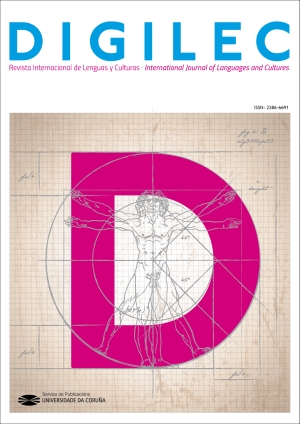Aprendizaje del español como lengua extranjera en la era digital: el aprendizaje móvil en el contexto camerunés
Contenido principal del artículo
DOI:
https://doi.org/10.17979/digilec.2024.11.11035Resumen
Uno de los objetivos fundamentales que persigue la enseñanza/aprendizaje de una lengua extranjera es el desarrollo de la competencia comunicativa de los aprendices. Sin embargo, ese objetivo no siempre se cumple. En realidad, aprender y hablar con fluidez una lengua extranjera es un desafío considerable, especialmente cuando el aprendiz no está inmerso en un contexto de inmersión lingüística y la mayoría de sus interacciones con la lengua suelen darse en el aula. Actualmente, gracias al auge de las nuevas tecnologías de la información y la comunicación (NTIC), las fuentes de input y output se han diversificado y multiplicado significativamente. Las nuevas tecnologías nos obligan a reconsiderar nuestra concepción de la enseñanza y del aprendizaje. En relación con ello, hoy en día hablamos de nuevos conceptos y teorías ligadas al aprendizaje, como son el aprendizaje móvil, el conectivismo, el entorno virtual de aprendizaje (EVA), el estudiante 2.0, etc. Debido a este nuevo ecosistema, se hace necesario acompañar a nuestros alumnos hacia esos nuevos senderos que condicionan el aprendizaje de lenguas y el desarrollo de la competencia comunicativa. A partir de una encuesta dirigida a 153 estudiantes cameruneses de español como lengua extranjera, analizamos la relación que tienen respecto al aprendizaje móvil. Identificamos los recursos móviles que utilizan para favorecer un aprendizaje efectivo del español. Desde la perspectiva de trabajar el aprender a aprender, este trabajo propone orientaciones de actuación que buscan un mejor aprovechamiento de los recursos móviles, con el fin de garantizar un aprendizaje autónomo más efectivo.
Palabras clave:
Detalles del artículo
Referencias
Cabero, J. (2007). Las necesidades de las TIC en el ámbito educativo: oportunidades, riesgos y necesidades. Tecnologías y comunicación Educativas, 45, 4-19.
Cantillo Valero, C., Roura Redondo, M., Sánchez Palacín, A. (2012). Tendencias actuales en el uso de dispositivos móviles en educación. La Educ@ción Digital Magazine, Junio, 147, 38-46.
Conde González, M. A. (2007). M-Learning, de camino hacia el u-Learning. Trabajo de Fin de Máster. Universidad de Salamanca.
Consultado en: http://gredos.usal.es/jspui/bitstream/10366/21829/1/TM_mLearningcamino.pdf
Djeumeni-Tchamabé, M. (2014). Téléphone portable et apprentissage mobile du français en Afrique subsaharienne (TEPAMF): une expérience menée au Cameroun. Adjectif.net, disponible en: http://www.adjectif.net/spip/spip.php?article321
Fotsing, J., Talla Tankam, N., Fute Tagne, E., Tonye, E. (2017). Usages des technologies mobiles en milieu universitaire africain: Cas des universités camerounaises. Journal of research in open, distance and e-learning, 1 (1), 57-77.
Guerrero Rodríguez, M. J. (2020). Aplicaciones móviles para la consolidación del léxico en ELE: análisis y comparativa. [Trabajo de fin de máster]. Máster Universitario de Enseñanza de Español como Lengua Extranjera. Universidad Pablo Olavide.
Hernández Requena, S. (2008). El modelo constructivista con las nuevas tecnologías: aplicado en el proceso de aprendizaje. Comunicación y construcción del conocimiento en el nuevo espacio tecnológico [monográfico en línea]. Revista de Universidad y Sociedad del Conocimiento (RUSC), 5, (2), 25-35.
Kem-Mekah Kadzue, O. (2016), Enseñanza y aprendizaje del español en Camerún: análisis de las creencias del alumnado/profesorado e implicaciones didácticas para una formación competitiva de estudiantes/docentes de ELE. [Tesis de Doctorado] Universitat de Lleida. https://www.tesisenred.net/handle/10803/399641
Kem-mekah Kadzue, O. (2018). TIC y Enseñanza del español en Camerún: Creencias del profesorado e implicaciones didácticas. Intercambio/Échange, 2, 84-96.
Kem-mekah Kadzue, O. (2020). Enseñanza en línea durante la crisis del Covid-19 en la educación universitaria camerunesa: logros y desafíos. Ehquidad Revista Internacional de Políticas de Bienestar y Trabajo Social, 14, 57–74. https://doi.org/10.15257/ehquidad.2020.0012
Mbo, C. A. (2020). Les enseignants de lycées de la région de l’Est (Cameroun) et l’usage pédagogique de WhatsApp: pour un développement des apprentissages informels. International Journal of Latest Engineering and Management Research (IJLEMR), 5 (7) (Special Issue), July, 51-56.
Monteagudo Alonso, I. (2021). El teléfono móvil como herramienta en la clase de ELE: una propuesta de usos y aplicaciones. En M. Saracho-Arnaiz y H. Otero Doval, (eds.). Internalización y enseñanza del español como LE/L2: Plurilingüismo y Comunicación intercultural (pp.754-773).
Ngnoulayé, J. & Gervais, C. (2015). Usages des TIC et formation académique des étudiants camerounais. Revue internationale des technologies en pédagogie universitaire/International Journal of Technologies in Higher Education, 12 (3), 36–50.
Ngnoulaye, J. (2020). Utilisation des technologies pour apprendre chez des étudiants universitaires du Cameroun. Usages et appropriation des technologies éducatives en Afrique: quelques pistes de réflexion. T. Karsenti, K. Toure, M. Lepage et S. A. Attenoukon, eds. Bamenda: Langaa, 217-239.
Nomo Ngamba, M. (2022). Enseñar y aprender lenguas extranjeras en un contexto de digitalización: el caso de la escuela normal superior de Yaundé (Camerún). DIGILEC. Revista Internacional de Lenguas y Culturas, 9, 21-40.
Ortega Zuñiga, E. J., Ospina Nieto, Y., Hernández Giraldo, A. F. Ramírez Ramírez, E. (2020). La tecnología contemporánea al servicio de la educación. En L. M. Cano Vásquez y J. Zambrano Acosta (Eds.). Usos docentes de dispositivos móviles en América Latina. (pp. 10-22). UPB.
Pacheco, A. (2008). Micro-Guías: Actividades de aprendizaje en dispositivos móviles basadas en micro-contenidos. Proceedings Latin American Conference on Learning Objects. https://www.academia.edu/31608286/Micro_Gu%C3%ADas_Actividades_de_aprendizaje_en_dispositivos_m%-C3%B3viles_basadas_en_micro_contenidos
Rodríguez Orgaz, C. (2018). Un análisis de aplicaciones móviles para el aprendizaje autónomo de ELE. Revista Electrónica del Lenguaje, 5, 1-49.
Rush S. (2011). Problematic use of Smartphones in the workplace: An introductory study. [Tesina de grado]. Central Queensland University. Rockhampton.
UNESCO (2013). Directrices para las políticas de aprendizaje móvil. París: Organización de las Naciones Unidas para la Educación, la Ciencia y la Cultura. https://unesdoc.unesco.org/ark:/48223/pf0000219662


